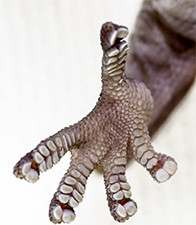
Car-makers' quest to lessen their vehicles' environmental impact is not limited to the pursuit of the electric car or autonomous driving technology that reduces fuel consumption.
US car-maker Ford Motors is embracing biomimicry to make its components more recyclable.
Biomimicry is the practice of studying and imitating natural phenomena found in plant and animal life to find innovative technological solutions. Popular examples of biomimicry include Velcro, which drew its inspiration from burrs that stick to people's clothing, and less-painful hypodermic needles inspired by the mosquito, whose bites are painless to humans.
In its latest environmental initiative, Ford is studying the gecko's sticky toe pads for clues to developing less wasteful methods for gluing its components together.
A key challenge to the recyclability of Ford's cars is the glue used to bond foams to plastics and metals, which makes these components almost impossible to dismantle for recycling later on.
The gecko's toe pads allow it to attach itself to a wide range of surfaces without moisture or surface tension, and easily detach itself without leaving a residue. This adhesive method is strong, with the average gecko, weighing 70g, being able to support up to 133kg, according to Ford.
Mimicking the gecko could spawn an adhesive that allows car materials to reliably attach for the duration of their lifespan, and easily detach for recycling, says Ford.
The carmaker recently hosted a biomimicry forum of nearly 200 researchers and designers, with participation from Procter & Gamble and The Biomimicry Institute, at Ford's Dearborn campus in Michigan.
Cardboard car
Lexus, the luxury vehicle division of Japanese car-maker Toyota, is showing off a full-scale, driveable replica of its new IS saloon model, crafted from 1 700 fully-recyclable pieces of laser-cut cardboard.
The replica, which sports a fully-fitted interior, functioning doors, headlights, and rolling wheels, runs on an electric motor fitted to its steel and aluminium frame.
While the one-off replica is not intended as a practical challenge to metal cars, it serves as a celebration of the versatility of cheap and sustainable materials.
Share